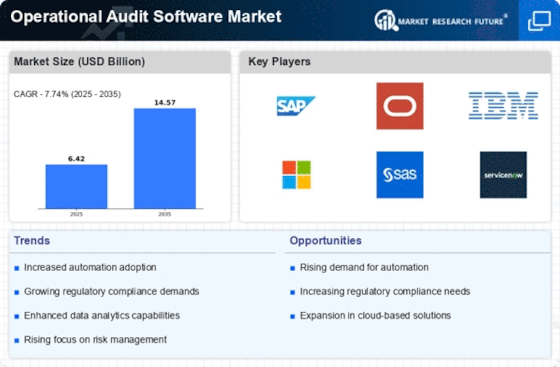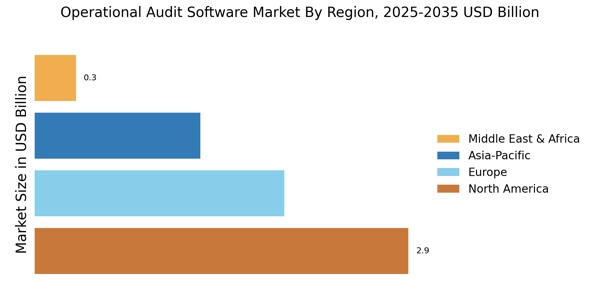Growing Focus on Risk Management
The growing emphasis on risk management within organizations is significantly influencing the Operational Audit Software Market. Companies are increasingly recognizing the importance of identifying and mitigating risks to safeguard their assets and ensure operational continuity. This shift has led to a heightened demand for audit software that can provide comprehensive risk assessments and facilitate proactive measures. The market for risk management solutions is anticipated to expand, with operational audit software playing a crucial role in this landscape. By integrating risk management functionalities, these software solutions not only enhance audit effectiveness but also contribute to overall organizational resilience, thereby driving growth in the Operational Audit Software Market.
Demand for Enhanced Data Analytics
The demand for enhanced data analytics capabilities is reshaping the Operational Audit Software Market. Organizations are increasingly relying on data-driven insights to inform their decision-making processes. As a result, audit software that offers advanced analytics features, such as real-time reporting and visualization tools, is becoming essential. The ability to analyze large volumes of data efficiently allows auditors to identify trends, anomalies, and areas for improvement. Market trends indicate that the analytics segment within audit software is expected to grow significantly, reflecting the broader shift towards data-centric approaches in business operations. This evolution is likely to bolster the Operational Audit Software Market as companies seek to leverage data for more effective audits.
Regulatory Compliance Requirements
The increasing complexity of regulatory compliance is a major driver for the Operational Audit Software Market. Organizations are facing heightened scrutiny from regulatory bodies, necessitating robust audit processes to ensure adherence to various standards. The demand for software solutions that can facilitate compliance with regulations such as Sarbanes-Oxley, GDPR, and ISO standards is on the rise. As companies strive to avoid penalties and reputational damage, the need for effective operational audit tools becomes paramount. Market data suggests that the compliance software segment is expected to witness substantial growth, further propelling the Operational Audit Software Market as businesses invest in solutions that enhance their compliance capabilities.
Integration of Artificial Intelligence
The integration of artificial intelligence (AI) into the Operational Audit Software Market is transforming how audits are conducted. AI technologies enable automated data analysis, anomaly detection, and predictive analytics, which enhance the efficiency and accuracy of audits. As organizations increasingly seek to streamline their operations, the demand for AI-driven audit solutions is expected to rise. According to recent estimates, the market for AI in audit software is projected to grow at a compound annual growth rate of over 20% in the coming years. This trend indicates a significant shift towards leveraging advanced technologies to improve audit processes, thereby driving growth in the Operational Audit Software Market.
Rising Adoption of Cloud-Based Solutions
The rising adoption of cloud-based solutions is a pivotal driver for the Operational Audit Software Market. Organizations are increasingly migrating their operations to the cloud to benefit from scalability, flexibility, and cost-effectiveness. Cloud-based audit software offers real-time access to data and facilitates collaboration among audit teams, regardless of geographical location. This trend is particularly relevant as businesses seek to enhance their operational efficiency and reduce IT overhead costs. Market analysis suggests that the cloud segment of the audit software market is poised for substantial growth, reflecting a broader shift towards cloud computing in various sectors. Consequently, this transition is likely to propel the Operational Audit Software Market forward as organizations embrace cloud technologies.

















